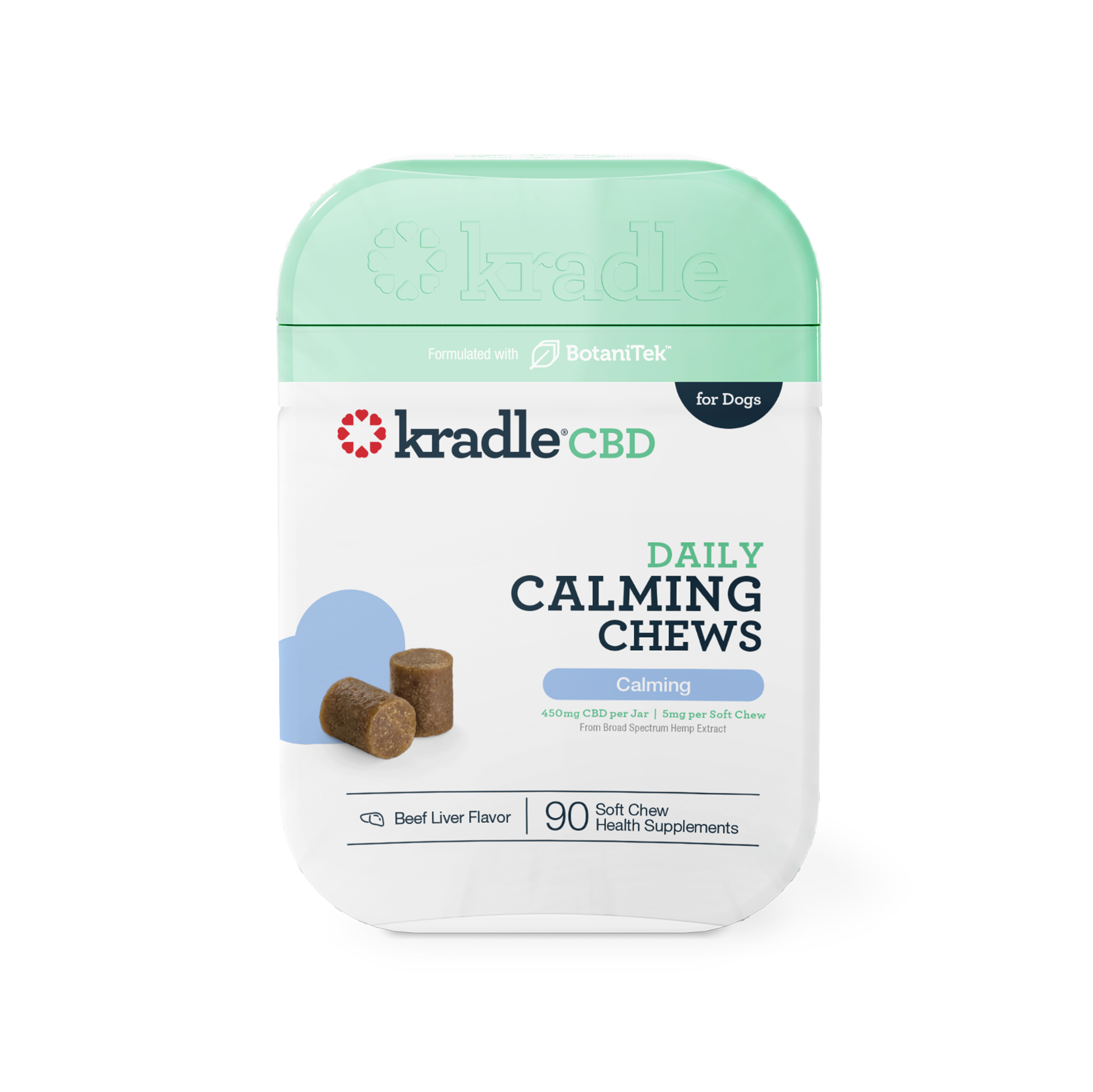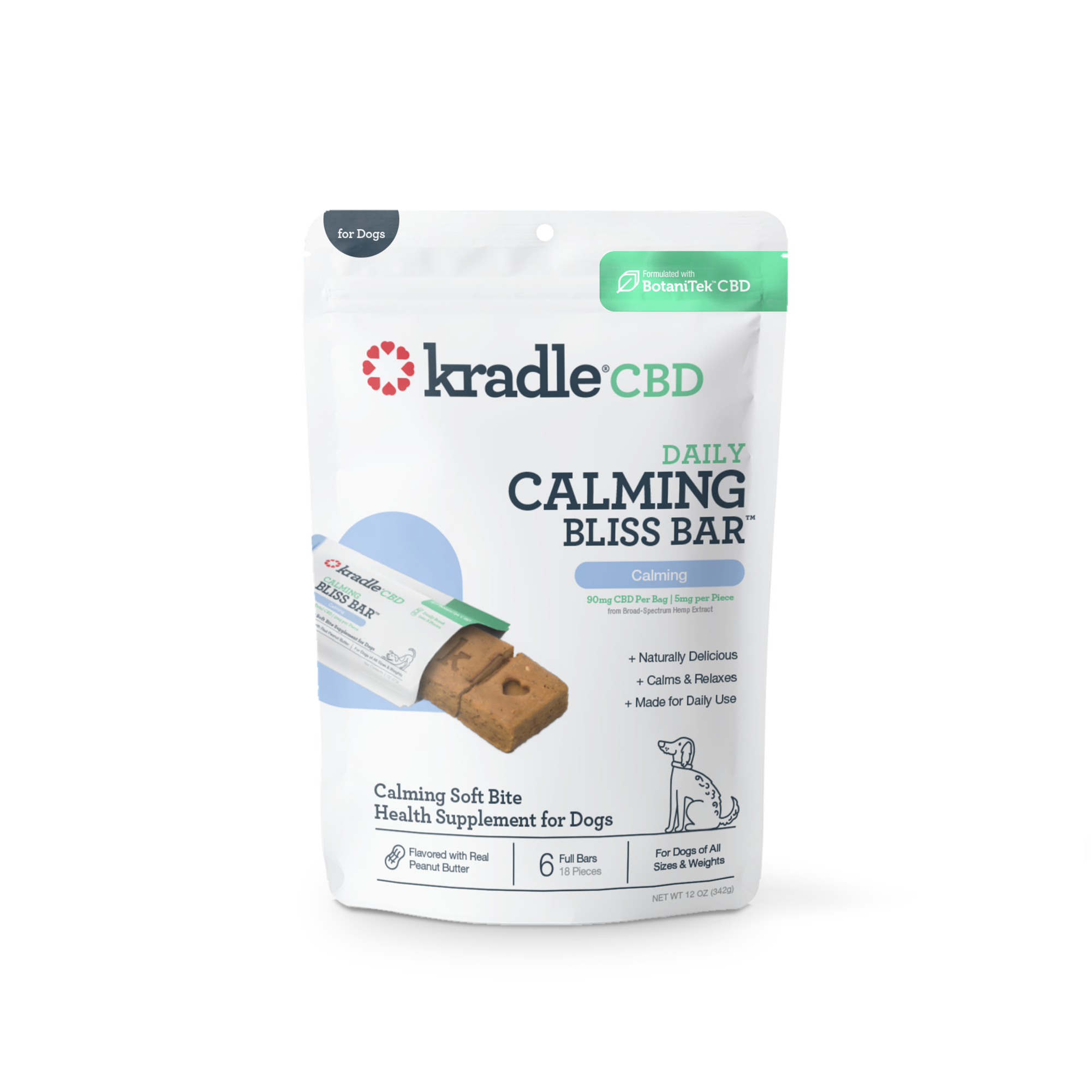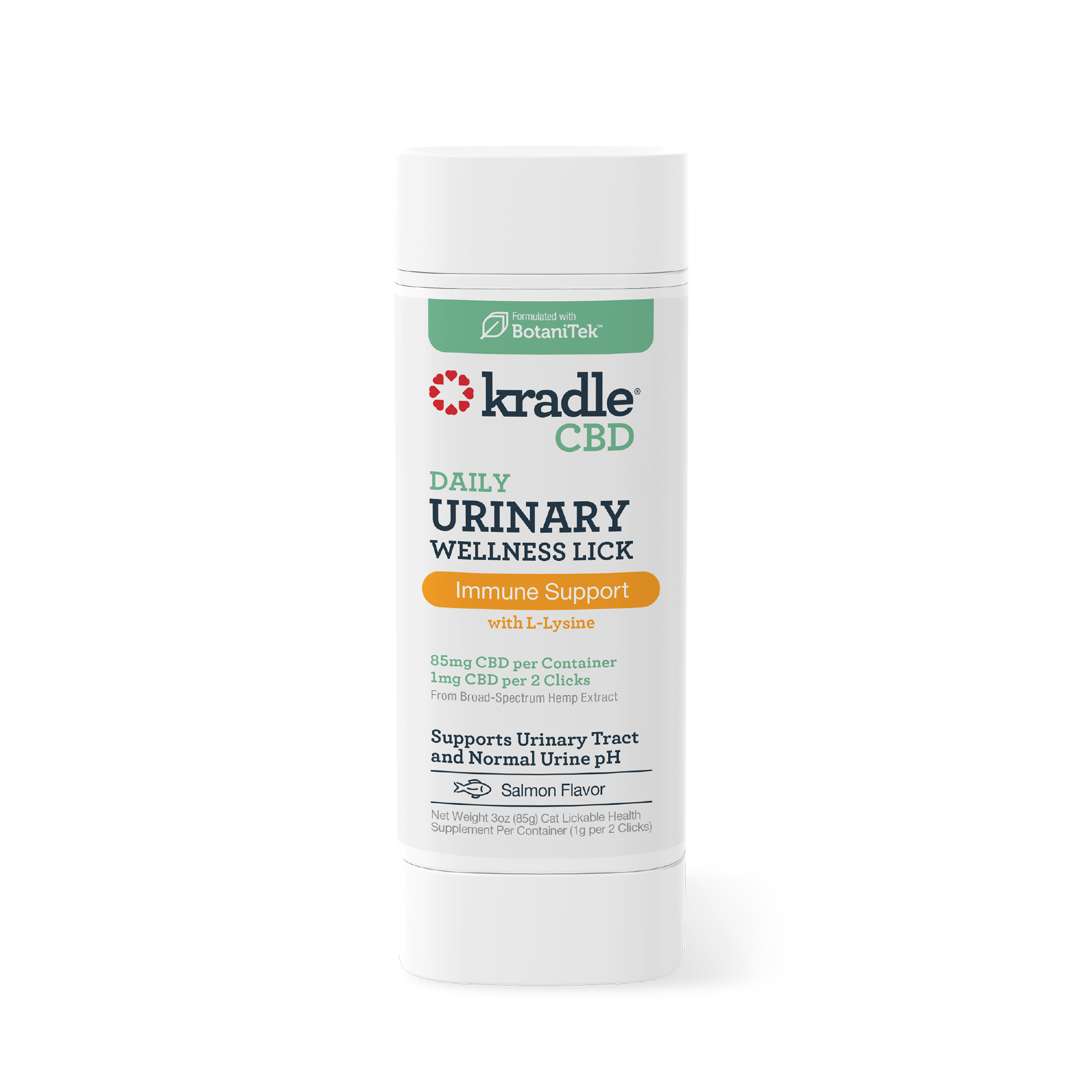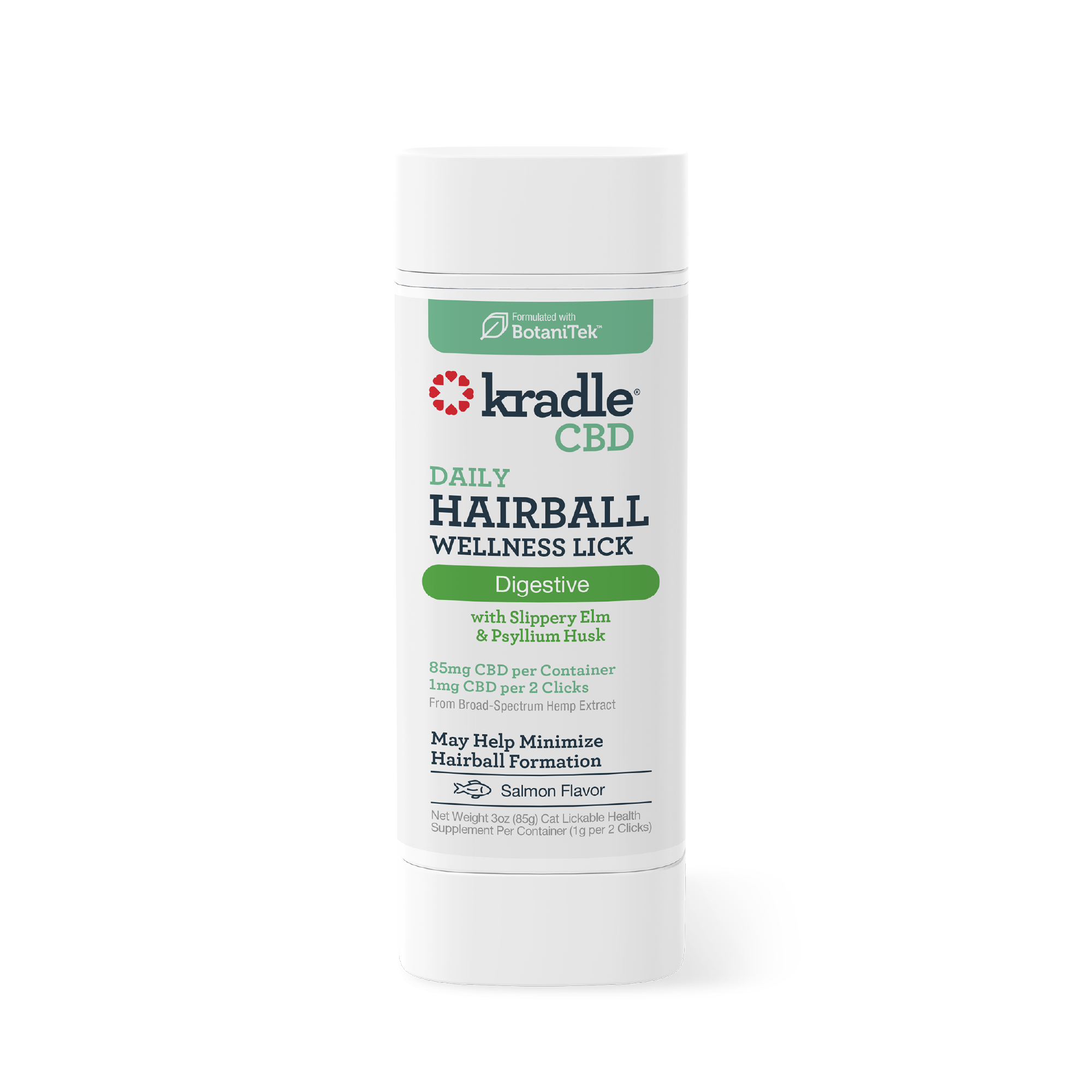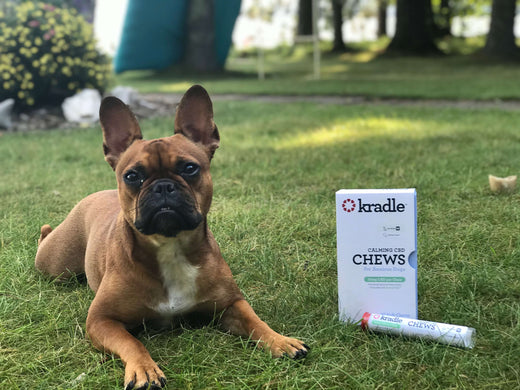
Kradle® Expert Lee Mayberry Answers All Your Questions About CBD for Dogs
There’s nothing more exciting than bringing home a new furry friend and welcoming them into your pack. Throughout the past year, more people than ever before are experiencing the joy of this moment. Many have stepped up to adopt or foster a dog since the start of the COVID-19 pandemic last spring, including first-time pet parents! According to The Washington Post, some shelters and rescue facilities are completely empty and unable to keep up with the heightened demand.
As special of a time as it is, the transition into a new home is oftentimes stressful for rescue dogs, who may be coming from unfavorable circumstances and/or traumatized by their past. Once they do finally become acclimated to their environment, they may still be fearful or reactive to even small things, like going on walks. CBD bars can help support these dogs by offering a safe, natural solution to help manage their stress and anxiety.
Rescue organization asks Lee Mayberry to host panel on CBD for dogs
Our partner and next-door neighbor, Spot’s Last Stop, a canine rescue organization located in Minnesota, recently welcomed us into their community of adopters to share more about why CBD is a viable, safe solution for the stress their dogs may experience. CBD Calming Chews for Dogs can be an effective way to help ease their anxiety naturally. Kradle’s Chief Quality and Regulatory Affairs Officer, Lee Mayberry, and Chief Marketing Officer, Brent Cooke, hosted a Facebook Live to answer all of the questions those in the Spot’s community had about CBD — such as how CBD works naturally with a dog's endocannabinoid system and the difference between CBD and THC (spoiler alert: they’re not the same thing).
Check out the replay below to learn more about CBD and what makes Kradle’s unique, patent-pending BotaniTek™ formulations a good option for you and your dog:
TRANSCRIPT:
[00:00:00.150] - Brent Cooke
Good afternoon, everybody, I'm sorry for the delays and the technical difficulties, but such is the world we live in right now. Quick introductions. My name is Brent Cooke. I am with the Kradle team. I work on the marketing and advertising side. Kradle is a CBD brand. It is the only CBD brand that is exclusively built for dogs and exclusively built to address stress and anxiousness in dogs. And that is something that is near and dear to my heart. I have a 110-pound Dogue de Bordeaux or French Mastiff named Stella, who is a rescue, and she has some pretty severe stress in particularly in these days since she's been spending so much time with me. When I go away, she she tends to break down a little bit. So I'm a Kradle user myself and I love my dog. I love Stella. And I definitely want to make sure that she's comfortable. I am joined today by my colleague Lee Mayberry, who I'll let introduce himself here. Lee is also on the Kradle team and really handles everything authoritatively from regulatory affairs to quality control. But I don't want to steal too much of his thunder. So, Lee, please introduce yourself.
[00:01:19.800] - Lee Mayberry
Thanks, thanks, Brent. So, as Brent said, my name's Lee Mayberry. I've spent the last twenty five plus years in the dietary, supplement, food and pet Space. I did a total of over 20 years in the Whole Foods market chain of companies, most of them the last about 15. That Whole Foods market before joining the Kradle team like Brent, I am I have a couple of rescue dogs. Mine happen to be both of mine are Border Aussies. So very smart, but obviously very active dogs. So I too use Kradle products, we like to say that one of the things we do with our products is we would never launch a product that we weren't comfortable recommending to family and friends. So I am, as Brent said, obsessed with the regulatory and quality side of the equation, sourcing the best vendors of raw material and the best co-manufacturers we can find. So hopefully we can answer some of your questions today. That's the whole goal is for us to respond to the questions or issues you have about CBD and how that works with your dog. And we'll kind of go from there, I guess.
[00:02:36.660] - Brent Cooke
Excellent. Let's stop sharing this opening slide so that everybody can kind of see our faces and without too much ado, we'll just jump right into it. I have some some guided questions here that we will go through. But please, if you have any questions that you want specifically answered, please enter them into the comments. Our team will get them to me so that we can talk about the things that you all want to talk about relative to CBD and your dogs. But let's start with just kind of the most basic question. I know there's a number of people on here that have varying levels of familiarity with CBD, but let's just start with what is CBD and then where does it come from? And then, of course, we have to broach the topic of how and what way is it related to marijuana or cannabis.
[00:03:27.660] - Lee Mayberry
Great. So, yeah, there's a bucket of questions in there. But I'll start with CBD is cannabidiol. It's one of just many cannabinoids that are found in the cannabis plant. So cannabis plants can be either marijuana or hemp. It used to be that the DEA looked at all of them together. But thanks to the farm bill, that kind of clarified that. So as long as there's less than 0.3 percent THC, then we have hemp. If you have more than 0.3 percent THC, even if it was grown in the exact same field right next to one another, it now magically becomes marijuana. So the rationale for that, at least on the part of the DEA and the FDA and Congress, is that as the sea levels rise, the likelihood of some sort of psychoactive effect increases as well. So CBD is, again, just one of the cannabinoids that naturally occur in cannabis. So CBD has been researched as a drug. The FDA has approved CBD as the sole molecule, as a single ingredient for certain seizure disorders in children. So when we formulated our product, we set out to find a product that had both CBD and other cannabinoids. We didn't want to use just CBD isolate because we didn't think that that's the way nature intended it to be. So we view CBD as the drug side of the equation. We think CBD, as it naturally occurs with other cannabinoids and in a more holistic formulation, has the ability to help your dog deal with stress and a lot of other things. Again, the analogy I like to give people between marijuana and hemp is they're the same genus and species. A little flashback here to high school biology or botany. They're the same genus and species, but they're bred for very different purposes. So a great analogy, given that we're talking about dogs, would be a a Great Dane and a Chihuahua are both the common domestic dog, but they were bred to look at it and be very different from one another. So although there are similarities, there are also great differences.
[00:05:51.390] - Brent Cooke
Thanks, Lee. So you talked a little bit about CBD and its coexistence with other cannabinoids and or versus CBD on its own. I think you used the term isolate. Can you talk a little bit about how we might look at different CBD products and try and find the ones that are isolated versus the ones that are part of a bigger party?
[00:06:13.260] - Lee Mayberry
Right. Great question. So CBD isolate, again, is just one chemical constituent. So it when it's extracted out of cannabis, it's just a crystal material looks kind of sugar like like many other chemical compounds do. So one of the things that that we were very obsessed with when we were trying to figure out our formulations on the front end was trying to find the right balance between the cannabinoids and try to find other ingredients that supported that. We're supporting characters in that cast. So I think we need to talk for just a moment about THC, if that's all right. So THC is a big issue. There are I know from my vet and conversations with my vet and his office that they see THC overdoses. I live in Colorado where recreational marijuana is legal and they see cases every week of dogs that have ingested edibles or otherwise ingested THC. And the problem with THC in dogs is that dogs have magnitude more of CBD or CB1 receptors, which is where THC attaches. Right. So dogs are much more sensitive to THC. So we at Kradle intentionally selected broad-spectrum hemp extract, which has no detectable THC versus a full-spectrum that would have THC.
[00:07:51.480] - Brent Cooke
Got it, so we can still see trace amounts of THC, even in a full-spectrum product versus broad-spectrum where you're not seeing traceable and then isolate, which is, as you said, just the the single cannabinoid of CBD, right?
[00:08:07.600] - Lee Mayberry
Correct. So CBD isolate will typically assay out in a lab analysis at ninety nine point five percent somewhere. I mean, virtually nothing tests out of 100 percent purity, but at very high purity, you may see broad-spectrum and full-spectrum products that have CBD contents in the 80 to 90 percent range. But again, they still have other naturally occurring components of other cannabinoids and terpenes and other things that work, if you will. I don't know if it's the best word choice but to sort of buffer and complement the actions of the of the CBD.
[00:08:44.850] - Brent Cooke
So I have to ask this question because we spend a minute talking about THC. Does CBD get you high and is it legal?
[00:08:54.630] - Lee Mayberry
So CBD does not get you high. It has no psychoactive effect. So so CBD, you're asking because you have the answer is no. And that's pretty well documented. So where confusion comes in is when people are using other extracts that have perhaps a higher THC level. And CBD right now has been vetted and approved by the FDA as a drug. So currently under the current FDA position, CBD, the isolate, the chemical itself, which they've approved as a drug, is not permitted for additive to foods, beverages or even dietary supplements. So we believe that a hemp extract. So when you think about just extracting all the plant matter and refining it, that contains CBD is a different ingredient, is a different article than pure CBD isolate. So an analogy that's kind of common in the supplement space is white willow bark, which contains sallerson and salicylic acid, is has aspirin like effects. Right. But it's not aspirin. So when I extract something down to its purest point and it becomes a single component at that point, FDA is oftentimes evaluating me as a drug and that's what happened in this scenario. So the CBD isolate has been evaluated and improved as a drug with limited use. We don't typically add drugs to foods and beverages. Right. So in this case, FDA said CBD isolate is not permitted for addition to foods or drugs, but CBD distillate that there are certainly some some believe and we would be people who subscribe to that, that a distillate that's the natural plant extract is appropriate and permitted.
[00:10:59.740] - Brent Cooke
Gotcha. So you talked you touched on the topic they're in on it, this is kind of a broader topic, but you talked about dogs, receptors to THC. Can you just talk just generally, how does CBD and how do cannabinoids interact with the body of a dog or even a human?
[00:11:11.590] - Lee Mayberry
So when you think about it, we have we have CB receptor receptors in the body. So when you think about those as a lock that's open and you think about the cannabinoids as a key that mesh into it, that's an easy way to think about it. So we have naturally occurring or endogenous cannabinoids in our body that's so that we have the endocannabinoid system, which is the whole system. So we have receptors, we have naturally occurring cannabinoids that lock into there. When you take a product that has CBD and other cannabinoids, what you're doing is you're bolstering the amount of of cannabinoids that are in the body circulating that have the opportunity to bind with those receptors. So CB1 receptors tend to be those that are more neurological and they tend to be linked to things like brain and musculoskeletal and mood. CB2 receptors tend to be more closely associated with things like inflammation. Both CB1 and CB2 receptors have a role in playing with immunity. So the goal is to have a significant enough level of cannabinoids that are circulating so that they can enter into this receptor key and help basically maintain balance in the body. So that's the whole goal behind supplementing with any of the cannabinoids other than THC, which is psychoactive. But you're trying to just maintain some some level of balance and in this case, calm and to help dogs deal with, you know, environmentally produced or other stress.
[00:13:02.200] - Brent Cooke
Excellent, and I know a question that we get a lot, and I'm sure it's on the minds of a lot of people watching this and specifically as it relates to their dogs. Right, so you and I both have our own pups and we and we give our pups Kradle products. But I think one of the big questions that everybody has when they're thinking about CBD for their dog is how do I know how much to give? And is there such a thing as too much? Right. Because none of us want to make that mistake if there's a risk profile there. Can you talk a little bit about that?
[00:13:33.880] - Lee Mayberry
When we formulated — it's a great question and it's one that I hear all the time from family and friends when I have conversations with them. Right. So Kradle, before we decided what ingredients to use, we started out and spent a lot of time evaluating the studies that had all been done on canines. We enlisted an outside expert to help us look at and evaluate those studies so that we were trying to eliminate our own bias and we intentionally formulated our products well below, significantly below any level where there was any kind of negative effects. So again, and I'm just going to go back and reiterate our our goal from the beginning and we live by it every day, is to create products that we're comfortable recommending to our family and friends and giving to our own our own dogs. So, yes, you can give too much there. You would have to give your dog a lot of CBD to see a very negative effect. Some people have reported there, certainly some reports circulating around the industry that CBD can create gastrointestinal diarrhea and other issues, but that is really associated with the carrier oils that are typically used. We don't sell the kind of entry level everyday tinctures that you see in the market. We've formulated our products into other delivery forms that are that don't rely on huge amounts of that MCT or coconut oil or other things that can contribute to diarrhea.
[00:15:12.010] - Brent Cooke
Gotcha, gotcha. That's really good, it's really good advice and I appreciate you kind of clarifying that in just just a little further point, because I want everybody to kind of understand this what do those studies show us when you see high levels or perhaps overly high levels of CBD, what would a what's happening in those dogs from those studies?
[00:15:37.030] - Lee Mayberry
So so what we've seen in those studies, what's been documented, and it's honestly it's the same negative impact that has been documented in the human trials is the potential for liver toxicity. So and you measure typically you would like liver toxicity by looking at liver enzymes. So, again, we intentionally have formulated at a level that is well below that. And I should mention, too, that our products are specifically targeted at different size or weights of dogs. So our products are sized for small, medium and large dogs. And again, we built in a huge safety buffer. The other approach we took and I don't know if we're ready to talk about that or not, it is rather than just relying on the cannabinoids or CBD as the hero ingredient, we also brought into the formulas what we refer to as BotaniTek, which is our patent pending blend of other botanicals and ingredients that have well documented safety profiles and use as dietary supplements in humans and pets to kind of complement the overall stress and calming effects of our products. So we're not just relying on CBD. One thing that a lot of people don't don't talk about in the industry, and we do pretty openly at Kradle is not every dog is going to react the same way to a CBD product or dosage. So you need to be willing to to alter the dose, whether it's higher or lower. I have a family member that's been using our medium Chews on her hundred pound Great Danes. And in theory, anything about 50 pounds would be a large serving for us. But in this case, she's dosing at a medium and seeing fantastic results.
[00:17:32.650] - Brent Cooke
That's great. I was actually going to ask you what what can we expect to see in our dogs as they get used to CBD? And I think many of us and it's worth noting, because this, myself included, we tend to use CBD in moments that we know are going to have anxiousness. Right, to use CBD if I'm leaving, because I know Stella is going to be upset when I leave. I don't. I live in the Southwest, so I don't suffer thunderstorms. But I have lived in the Midwest and the thunderstorms are really big deal. So that can come on, that can be very onset. So talk to me a little bit, Lee, about how we should think about the use of CBD, either in a regimented way or in an ad hoc kind of way. What what we can expect to see when we do that.
[00:18:22.570] - Lee Mayberry
Yeah, so oftentimes people think that there's going to be a a magic moment where all of a sudden the dog is going to react. And that may be so it may be that there are fireworks, there may be events that we can anticipate, but also events that that are kind of spontaneous. Right. So somebody shows up at the door and pounds really loud on the door or as opposed to events that we can anticipate, like going to the vet, going to a kennel, going to the dog park, taking a car ride. So it's incumbent on us, as you know, as far as dog owners as the the the pet parents, that we anticipate those scenarios and try to help our dogs deal with them, because as we all know, our stress will transfer to them. So if we let their stress levels escalate, the odds are ours are going to escalate as well. And if we can can get a handle on those on the front end, that's the best approach some people prefer to give their dog. And and there's certainly an amount of research that says that giving CBD consistently or CBD containing products consistently has a better result because it builds up those cannabinoids in the body as opposed to just trying to treat it as a silver bullet at the last minute. Now, certainly some of our products our Melts are formulated to be a more instantaneous dissolve and result. But you actually need to tailor it to your it's no different than any other food that a food or a drug or any other approach you take to your dog. You need to tailor it to the unique characteristics and personality of your dog.
[00:20:13.450] - Brent Cooke
Terrific. So, Lee, I got one here that I'm ashamed that I didn't think of because it's very relatable. So we talked a little bit about broad-spectrum, full-spectrum and isolate. There's some other kind of labeling confusion, I think, in the marketplace about using other terms like hemp oil, hemp seed, hemp seed, oil, CBD. Can you talk a little bit about what we should be looking for and what are those kind of different things mean? It looks like Lee may be frozen a little bit. I can tell you. You're going to have to fill in for him. I can certainly do that. And I have another question that has come through. From Marissa. So, Marissa, thank you for jumping in with a question. Sounds like you have a dog that has anxiety with storms and only at night. What's the best product? Give a CBD Melt when the storm is coming? Yeah, so look at the as Lee was starting to say, just as we lost him, our Melts product is formulated with an extra dose of CBD and it is in a delivery mechanism, a Melt that is intended to dissolve quickly and so is intended to bring more of that kind of quick onset relief, those moments that we don't expect to see coming. The other thing you might try is just a Chew a day. So our Chews, the dogs really love our Chews. We've gotten just tremendous feedback on the palatability of the Chews. If, you know, the storms are coming at night, try a Chew day, you know, get the dog used to having some CBD in their system. One of the things that Lee was talking about is how CBD is introduced into the system as an augmentation to the naturally occurring cannabinoids in our system with those elevated levels and a storm rolls through one more Chew may do it if they already have kind of some CBD in their system. It is important to note and again, this goes to Lee's point on dosing, if you want to scale back the dosing, in other words, if you're saying, look, I don't want my dog to be on CBD all the time, I don't need them to be calm all the time, it is OK to just have the cannabinoids in their systems and and get reintroduced at higher levels. Let me see, we got one other thing here, we were starting to talk about the difference between hemp oil, hemp seed and CBD. So really, the thing to note is that there's there's a lot of inconsistencies in the marketplace on labeling. In some cases, you may see the exact same product labeled, both CBD and hemp. A lot of that has to do with the the ways in which people can sell things. So certain certain sales platforms don't allow CBD products, but they allow hemp products. So manufacturers of these products will just simply relabel the same exact product that way. We have stayed away from that. We label all of our products as CBD products intentionally because that's that's what we believe in and that's what we think is the most naturally occurring way to achieve the calming results that Lee was speaking to. It is important to know specifically in hemp seed, it's really a protein. The other places a lot of people will see hemp seed is as a protein supplement. You can see it in places where you get protein shakes. You can see it occurring in protein supplements. So in a lot of ways, you know, anything being labeled as hemp seed or hemp seed oil is really not going to get you the same effects that you want of those cannabinoids in the way that they interact with your pet's body, because it is really just much more of a protein. Try to see if we can get Lee to rejoin. I apologize for this. And by the way, for those of you who are on, thank you for being on, Drew is our producer in the background. So I know that you're hearing the voice of God occasionally and Drew is helping me out specifically in terms of getting this through. And it looks like we got another question coming through. From Alex, Alex, thank you. If we put a dog on Chews in the morning and evening to help a transition and as the dog adjusts, do you taper down versus cold turkey then use as needed? Great question. So the short answer is there's no need to taper down. You know, it's not there's not going to be any adverse effects on the dog if you take them off of CBD at any point. And that's the wonderful thing about all of our ingredients being naturally occurring, ingredients that interact with your dogs, naturally occurring endocannabinoid system, that's a hard word to say. Took me weeks to say. So I just call it the ECS. But if it's working with your dog's ECS, there really isn't any problem with going cold turkey. If you are using a Chew in the morning and evening to help the dog transition, I would say just react to the dog. As the dog gets more comfortable, maybe go down to one a day or something to that effect. And if the dog has certain trigger events, as you as you learn about living with the animal, just as we can learn about living with other people, you know, just be prepared to reintroduce as needed, you know, additional Chews. But generally speaking, Stella gets to a day beef liver Chew, because, you know, she she appreciates the beef liver more than she does the chicken. And it's like I said, if I know, I'm going to be gone, I'm going to be gone for a while, I will use the Melt product on her as well. Let me pause for just a second. Thank you for the question, Alex. I think we got Lee back, maybe in voice, but not in an image. Lee, are you there?
[00:26:54.050] - Lee Mayberry
I am by phone, so as we were saying earlier, there would be it would not be COVID world if we weren't having technical difficulties. Apparently my Internet went down, so I am on my phone, so I'm happy to try to respond to questions by phone.
[00:27:12.020] - Brent Cooke
Yeah. So, Lee, I took a little bit of a shot at answering the question on hemp oil, hemp seed oil, CBD. And I talked about specifically hemp seed really being a protein and how it shows up a lot in protein supplements or protein shakes and that type of thing. But maybe you can offer a little finer point on the differences there.
[00:27:32.870] - Lee Mayberry
Sure, I mean, it's a great ingredient. It's a source of protein, it has some omega some essential fatty acids. So hemp seed powdered up, as you noted, is a protein, great ingredient. We sold it for years at Whole Foods Market in a variety of products. Hemp seed can also be pressed for oil, but hemp seed oil does not contain CBD or other significant levels of cannabinoids. So it always makes me pause when I see a product that calls out it's hemp, seaweed or hemp seed oil with the assumption that that's going to have a significant effect on on stress or calming in a dog. I will say, though, that omegas do have some value, obviously, in a dog's diet. You see, omegas added to a lot of dog food and other dog products. So they're great ingredients, but they are not significant calming ingredients and they aren't going to provide any CBD or other significant cannabinoids.
[00:28:44.660] - Brent Cooke
Terrific. Thanks Lee. I've got another question from Amanda. Amanda, thank you for asking this, because it's a really good question and frankly, one that I have some personal experience with. It says that I have one dog who manages to know any time something's not a "treat" regardless of the smell, taste. My question is in reference to the Melts. I can't get my dog to take it or even shove it in his cheeks or tongue, so I wrap it in cheese. Does giving the food lessen the strength or results? And Lee, before I let you answer the question about lessening the strength, I just have to share with you. I love everything about Stella. She's got the biggest heart and she's such a nurturer. But she's not the brightest bulb on the tree. And her challenge with the Melts is very relatable. I have tile floors and I peeled a number of them off the tile floor before doing exactly what you are doing, which is introduce it with food. So, Lee, can you talk about whether or not we run any risk of lessening strength by introducing these products with food?
[00:29:45.820] - Lee Mayberry
Yeah, it's a great question and I am another person. My dogs do not particularly appreciate the Melts as Border Aussie mixes they are that are not particularly food motivated. They are definitely frisbee and tennis ball motivated. But food is not in their top five list. So the Melts are not a big favorite of theirs to choose. They take with no problem. The Toppers were great, but giving with food is not a problem. And the reason for that is while it may well ingesting the food may in some ways slow down the initial digestion CBD and all the cannabinoids really uptake well with dietary fat or other fats present. So having a certain amount of fat along with it, whether you put it in a piece of cheese, wrap in a piece of meat, whatever you do with it, put it with peanut butter, none of those things are going to lessen the overall amount of CBD that's taken up. Again, it may take it a little longer to get into the dog system, but using it with food will not decrease the amount of total uptake. In fact, it may actually help.
[00:31:02.670] - Brent Cooke
Excellent, excellent. And we've got a we've got a follow up from Amanda here, it's another question about the Melts. She has Melts that are meant for large dogs. So our large dog sizes are anything over 50 pounds, fifty one plus pounds. And she'd like to use it on a smaller dog that's not quite fifty pounds, is it OK if she cuts the Chew in half and gives it or excuse me cuts the the Melt in half and gives it half? What do you think?
[00:31:33.150] - Lee Mayberry
I'm always reluctant to try to half dose or sub dose any product, whether it's a drug or one of our products. I think that certainly, you know, that's not something we would recommend. We certainly have tried to dose the products appropriately. I understand that if you have more than one dog, you may be trying to buy one product that you can use across both. But that's you know, we've very intentionally lifted the dosage levels on the product. So while that's something that I understand the desire to do it, we probably wouldn't directly recommend that.

